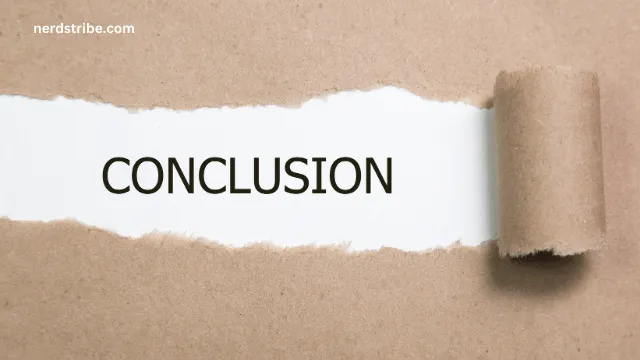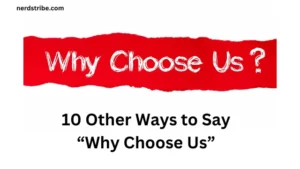When wrapping up a speech, an essay, or even a business email, how you end matters just as much as how you begin. The phrase “In conclusion” is a classic go-to, but it can often feel repetitive, overused, or uninspired. Choosing the right words to signal the end of your message can make your communication more engaging, polished, and memorable.
Whether you’re drafting a persuasive essay, presenting to an audience, or finalizing a report, the closing phrase is your last chance to leave a lasting impression. A carefully chosen alternative to “In conclusion” can show creativity, professionalism, and even confidence. It sets the tone for how your message is received and remembered.
This blog explores 10 fresh and effective alternatives to “In conclusion.” These options not only bring variety but also help you end on a stronger note, ensuring your message resonates. Ready to upgrade your closing phrases? Let’s dive in!

Contents
- 1 1. To Wrap Things Up
- 2 2. All Things Considered
- 3 3. In Summary
- 4 4. To Bring It All Together
- 5 5. Ultimately
- 6 6. In Closing
- 7 7. As We Have Seen
- 8 8. To Conclude
- 9 9. With That Said
- 10 10. To Sum Up
- 11 Conclusion
- 12 FAQs
- 12.1 Why should I avoid overusing “In conclusion”?
- 12.2 Are these alternatives suitable for academic writing?
- 12.3 Can I use these phrases in professional emails?
- 12.4 What’s the best alternative for casual conversations?
- 12.5 Should I choose an alternative based on tone?
- 12.6 Can I use multiple phrases in one message?
1. To Wrap Things Up
This casual yet effective phrase is great for summing up ideas in conversations or informal writing.
- Example: “To wrap things up, our team believes this approach will yield the best results.”
2. All Things Considered
This is a thoughtful way to summarize and reflect on what has been discussed.
- Example: “All things considered, moving forward with this strategy seems like the best option.”
3. In Summary
A straightforward alternative that works in both formal and informal contexts.
- Example: “In summary, the evidence supports the need for immediate action.”
4. To Bring It All Together
Use this phrase to tie up multiple points into a cohesive conclusion.
- Example: “To bring it all together, our research highlights the importance of innovation.”
5. Ultimately
This single word packs a punch and is perfect for delivering a decisive final statement.
- Example: “Ultimately, our success depends on how well we implement these changes.”

6. In Closing
This phrase works well for speeches, presentations, or formal writing.
- Example: “In closing, I’d like to thank everyone for their contributions to this project.”
7. As We Have Seen
A reflective phrase that reinforces your points by revisiting key ideas.
- Example: “As we have seen, collaboration and innovation drive success in today’s market.”
8. To Conclude
A simple, effective phrase for formal writing and presentations.
- Example: “To conclude, this project has demonstrated significant potential for growth.”
9. With That Said
This conversational phrase is great for transitioning into a final thought or decision.
- Example: “With that said, we’re excited to move forward with this plan.”
10. To Sum Up
Perfect for quick and concise endings, this phrase gets straight to the point.
- Example: “To sum up, the benefits clearly outweigh the risks.”
Conclusion
Closing your message with purpose and clarity is a skill that can set you apart in any form of communication. While “In conclusion” is a reliable phrase, these alternatives add a layer of professionalism, creativity, and freshness. Whether you’re writing an email, giving a presentation, or crafting an essay, the right closing can leave a strong, lasting impression on your audience.
Experimenting with different phrases allows you to tailor your conclusion to the tone and purpose of your message. It’s not just about ending a discussion—it’s about leaving a final thought that resonates and reinforces your main points. Next time you’re wrapping up, try one of these alternatives and notice the difference it makes.
FAQs
Why should I avoid overusing “In conclusion”?
Overusing “In conclusion” can make your writing feel repetitive or uninspired. Alternatives bring variety and impact to your message.
Are these alternatives suitable for academic writing?
Yes! Phrases like “In summary” and “To conclude” are excellent for formal contexts, including essays and research papers.
Can I use these phrases in professional emails?
Absolutely. Options like “To wrap things up” and “In closing” work well in emails, reports, and presentations.
What’s the best alternative for casual conversations?
Phrases like “To sum up” or “With that said” are conversational and great for informal settings.
Should I choose an alternative based on tone?
Yes. Tailor your phrase to match the tone and audience of your communication, whether formal, casual, or conversational.
Can I use multiple phrases in one message?
It’s better to stick to one strong phrase to avoid redundancy. Select the one that best suits your closing tone.








